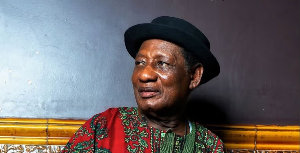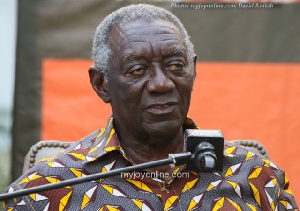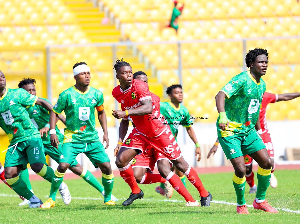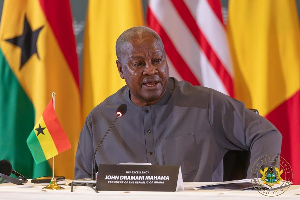“The political climate in Ghana has lately been plagued by corruption and uncertainty. The Mo Ibrahim award for “Achievement in African Leadership” rewards good governance with five million USD paid over ten years to support government programs.
The award was not issued in 2009 or 2010 despite that Kufuor was widely considered a forerunner. This snub was seen by Ghanaian news sources as a criticism of corruption in several of Ghana’s recent administrations, as well as a reaction to allegations of a flourishing cocaine trade in Ghana” (Daniel Runde).
Woyomenomics versus cocainenomics
Ghanaians have a difficult choice to make this year as they go to the polls.
This difficult choice hovers between Woyomenomics, the democratic socialism of the National Democratic Congress (NDC) and Cocainenomics, the neo-liberalism of the New Patriotic Party (NPP).
In Ghanaian political practice Woyomenomics and Cocainenomics fall under the Orwellian rubric of doublespeak, both terms merely descriptive synonyms for the same idea of cyclical shoplifting klopemania—stealing galore—which has been taking between the two major political parties.
That anti-Brodingnagian man with the off-putting Locally Acquired Foreign Accent (LAFA), Akufo-Addo was a member of this Cocainenomic government of reprobate thieves, a government which Daniel Runde’s caustic remarks only partially describe for effect—if at all.
These ideas both of which represent the two sides of the same coin of the Ghanaian political economy, in fact also make for an Orwellian paradox of arrested or negative development—in other words, the blight of economic and political development—in the Ghanaian body politic.
Every single evidence points to the fact that both parties stand for kleptomaniacal corruption, the politics of the belly, and prebendalism—no less.
Akufo-Addo’s memorable defeat at the pugilistic hands of the legal juggernaut, Tsatsu Tsikaka, and his substandard performance as the Attorney General compelled the office of the presidency to transfer him to the Ministry of Foreign Affairs.
As a matter of fact Ghanaians largely provided the critical mass and the political pressure, both of which compelled Kufuor to bring down the mediocre Akufo-Addo, namely the latter’s secondment to the Ministry of Foreign Affairs.
Right under the snooping radar of Akufo-Addo’s Lilliputian ministerial nose, diplomatic and non-diplomatic passports reportedly disappeared under mysterious circumstance only to reappear in the company of international drug dealers who, once again, are either reportedly related to the political sniffer dog himself, Akufo-Addo, or to shady persons closely connected to the uppermost echelons of the ethnocentric NPP.
This government also reportedly mysteriously alchemized literally tens of bags of cocaine into konkonte, while at the same time ignoring public clamor for something radical to be done about public corruption under this government.
Akufo-Addo did nothing about this public clamor. Rather, he vigorously pursued some alleged political criminals in the erstwhile government of the NDC, prosecuted them in courts packed with Kufuor’s cronies, and sent to prison consequently.
This was probably why Rawlings consistently tried to prevail upon Mills to pursue those rotten political criminals in the Kufuor government, daunting pressure conman T.B. Joshua advised Mills against in the interest of national peace.
Now, pending the revocation of the controversial judgment a High Court delivered in his case involving the political crime of willfully causing financial loss to the state by the Supreme Court, Tsatsu Tsikata’s remains theoretically or tentatively vindicated.
The Court of Appeal that sat on the case reversed the earlier decision of the High Court describing it as “a miscarriage of justice.”
Yet Akufo-Addo’s central role in the Drill Ship Saga, so-called, remains shrouded in the convoluted jargon of partisan politics.
The political corrupt Kufuor, Akufo-Addo’s boss and one of the important enigmatic co-authors of the Panama Papers, blamed the rampant political corruption in his government to biblical Adam and Eve.
Kufuor was of the opinion—contrary to that of public opinion at the time—that if he paid attention to every single corruption that came to his desk and dealt with it his government would collapse.
Accordingly, because he did not want to see his government collapse he looked the other way as the vampire of public corruption gnawed at the soul of the nation.
Thus, to a certain extent the Ibrahim Foundation denied the Ibrahim Prize for Achievement in African Leadership to Kufuor because of these facts.
Significantly, Akufo-Addo is partly to blame for this abysmal record chalked under the Kufuor administration because he, namely Akufo-Addo, as an influential cabinet member in the Kufuor government who jointly held the portfolios of Attorney General and Minister of Justice, failed to act in cleaning up corruption in the government.
The mediocre Akufo-addo turned the official powers of his ministerial agency into one of political and moral inaction.
In fact, he sat there on the political sarcophagus as a ventriloquist dummy as members of the political cartel of which he was a member looted the nation with reckless abandon.
Bird of the same feather flock together
Will the corrupt Kufuor even vote for this mediocre, corrupt Akufo-Addo?
Possibly yes, though we have every reason to doubt it.
“Show me your friend, and I will show you your character,” so goes a popular saying.
What defines the political charactorology of Akufo-Addo? Of Kufuor?
Kleptomaniacal neo-liberalism!
Akufo-Addo’s poor political leadership, the main guy at the headship of the ethnocentric NPP, has hurt the contemporary legacy and political personhood of Kufuor in several important aspects.
Since Akufo-Addo took over the leadership of the ethnocentric party through scandalous allegations of outright bribing of party delegates and intimidation and lodging of political shambolic lies against some of his rather better qualified opponents, the party and its support base have not known peace.
This party is helplessly and hopelessly wobbling under his divisive Orwellian leadership.
Regrettably, this once-formidable party has become an anorexic skeleton of its former self.
This juvenile, bubbling party which overturned the political entrenchment of Rawlings has now become a nagging Merlin-like old man, a Harry-Porter-like virago.
Most of the influential Kufuor surrogates have been purged from the party to make way for Akufo-Addo’s ever-ballooning mediocrity and ego.
Evidently, Akufo-Addo did not learn anything during his days as an Nkrumahist. And this is why some of us are wondering what he is bringing to the political table.
His boss, the slimy corrupt Kufuor had all the money in the world, enjoyed incontinent Western patronage, had a relatively small debt burden, sold off some of the viable state assets Nkrumah left behind, yet he did comparatively achieve so little for the country, Ghanaians, and Africa.
Public corruption alone consumed a chunk of the variables mentioned in the penultimate paragraph.
Kufuor stands behind a frosted glass shouting “Vote for Akufo-Addo” from the rooftops as though he, himself, believes in that maudlin jeremiad of an obituary.
This Machiavellian frosted glass which looks more like political Alzheimer’s, and is part of the insidious personality of the Flagstaff House, a den of thieves for that matter, was designed in the form of the Golden Stool. Akufo-Addo wants so badly to be part and parcel of this shambolic den of thieves!
What technocratic capacity does Akufo-Addo have that can transform the country?
What lasting achievements can he boast of as a cabinet member of the Kufuor government and as a Member of Parliament for the Abuakwa South constituency?
If there are in fact any, why has his campaign team failed to make these lasting achievements part and parcel of the party’s electioneering plank?
They doggishly and sheepishly rail against “socialism” and “democratic socialism” yet as soon as they assume political office, they quickly resort to socialist intervention programs.
The anti-industrialists and political Luddites who made up the ethnocentric forebears of this ethnocentric party of which Akufo-Addo now belongs and to which he claims questionable loyalty, were behind the struggle against independence for the Gold Coast, sustainable industrialization of Ghana under the able and visionary leadership of Kwame Nkrumah, and terrorism across the length and breadth of the maiden nation-state.
They called the infrastructural and industrial foundation Nkrumah laid down for the country “prestigious.” Yet today, they have unabashedly sold these state assets to and among themselves.
Will the corrupt Kufuor even vote for this mediocre, corrupt Akufo-Addo? Will Kufuor vote for President Mahama?
Ungrateful nation wreckers! Hypocritical inglorious bastards, Ghanaian politicians—all of them!
Closing remarks
We all saw the barely visible dry crocodile tears Kufuor and his supporters shed when the Panama Papers exposed his deeply involved underhanded co-authorship of possible public corruption. These kinds of schadenfreude tears are proverbial in the Ghanaian political practice.
These chameleonic professional mourners or moirologists sheepishly follow their “favorite” political candidates everywhere but secretly mourn their political deaths. This is largely because it is not always easy to tell one political plumage from the nebulous characterology of the Ghanaian political landscape.
At the end of the day it is our wish that neither major political party gets a nodding largess from popular sovereignty, for Ghanaians deserve a non-establishment political party which has been free from the seismic scandals of public corruption commonly associated with their duopolistic system.
Looking at the gargantuan scale of public corruption recorded thus far in the contemporary political inventories of both the NPP and the NDC Ghanaians will be best advised to look elsewhere for salvation.
This is never about “the devil you know is better than the angel you don’t know.” Rather, it is about the Woyomenomics you know is not better than the Cocainenomics you know!"
References
Daniel Runde. (Dec. 3, 2015). “Ghana’s Prosperity Hinges On Next Year’s Elections.” Retrieved from http://www.forbes.com/sites/danielrunde/2015/12/03/ghana-falling-star-2016/#72a03cb421d7
Opinions of Wednesday, 7 December 2016
Columnist: Kwarteng, Francis
Will Kufuor vote for Akufo-Addo?
Entertainment














